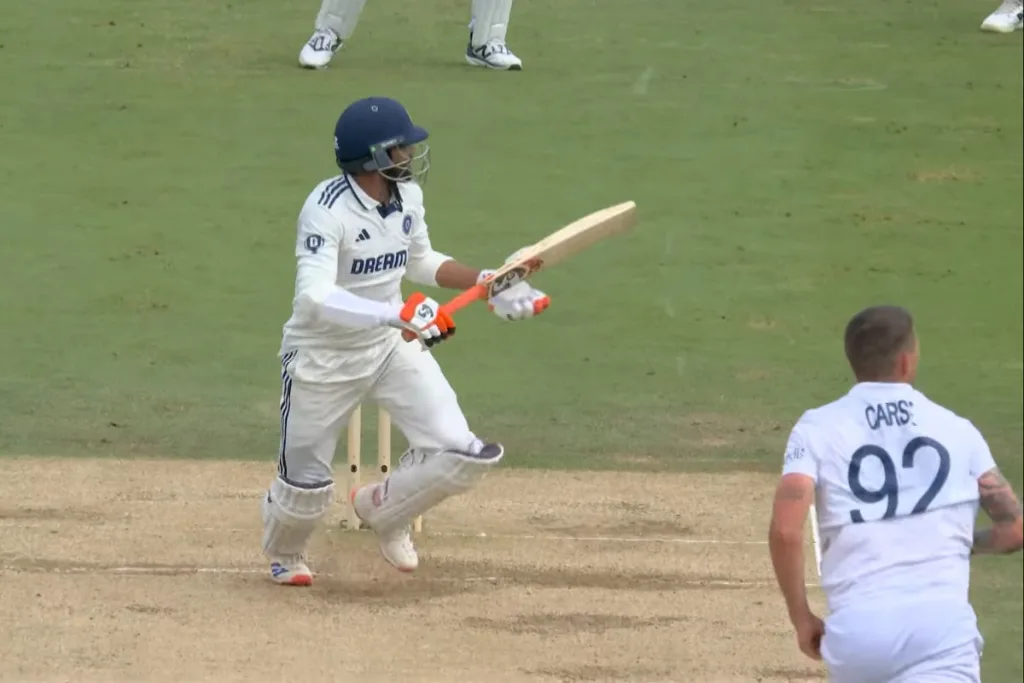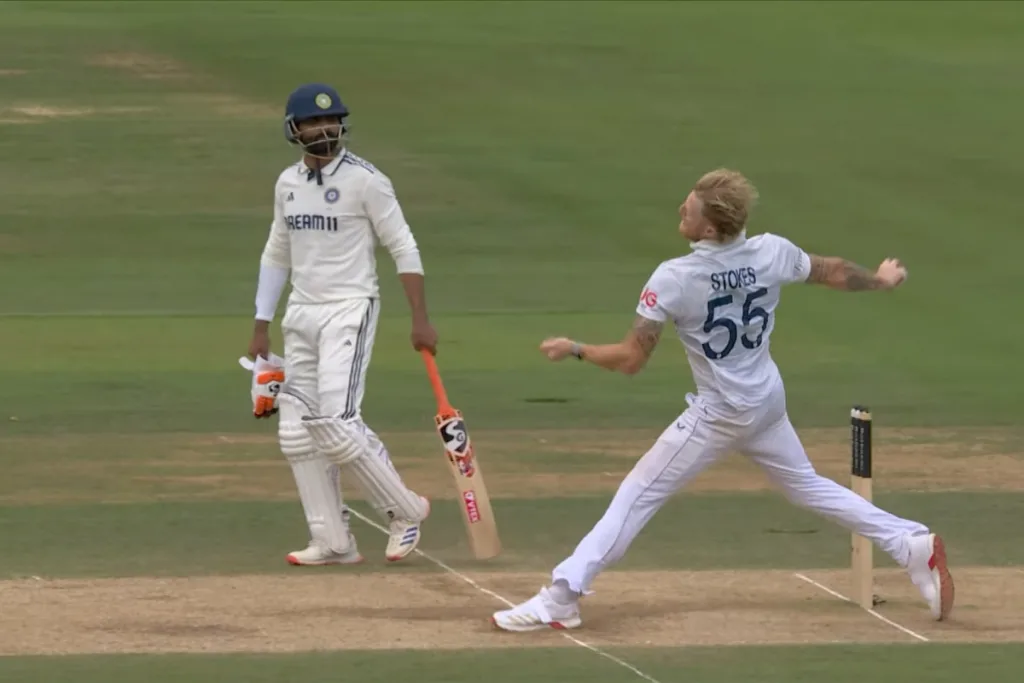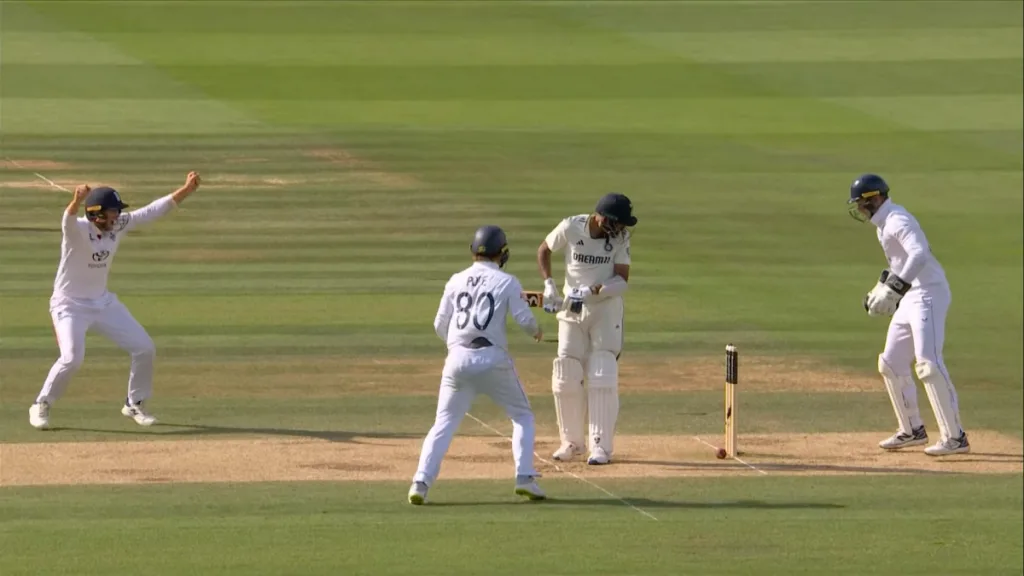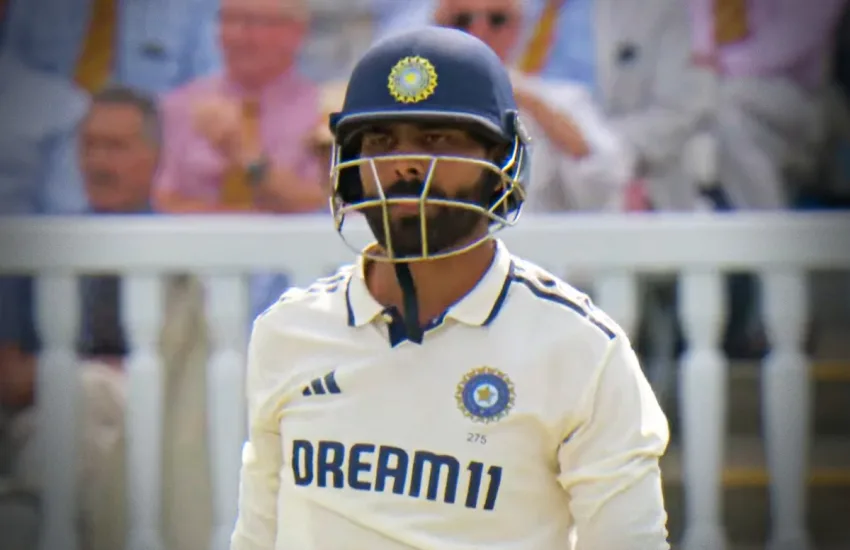Hold us here, Test cricket. Hold us here in uncertainty; at the sour spot of maybe or maybe not. Leave us here a while to grow overfamiliar with the sight of Ravindra Jadeja turning down another single because it’s still quite early in the over.
We all know that a tight finish is good – and a tight finish in the Test format quintuply so – but the climax to the Lord’s Test also highlighted the magnificent breadth and scope of the five-day game – the sandbox format.
In the first Test of this series, a Ben Duckett powered England batting line-up chased 371 to win, almost entirely on the final day. They scored at over 4.5 runs an over, the boundaries flowed and it was thrilling.
On the final day of the third Test, India made 201 fewer runs than that at roughly half the pace. Boundaries were rare but given the lower target, each one was twice as valuable as at Headingley. Despite that fact, a lot of the time when Ravindra Jadeja could have taken runs, he wilfully declined them.
This finish was, if anything, even more thrilling.
Breadth and batter
The shorter the format, the narrower the players’ options. In limited overs cricket, batters, in particular, are obliged to progress quickly. The only real question is just how far they push that. Bowlers’ tactics are shaped by this with additional constraints imposed by how many overs they can bowl.
In contrast, a Test match stretches upwards and outwards, as far as the eye can see; a colossal span of pristine white canvas. You can do what you want with it. Spin or seam; length or yorkers and bouncers; target the stumps or hide the ball way outside off stump. Slog, block, get ’em in singles or leave all the run scoring to the bloke at the other end. Make a dash for it now or kill time and hope things get easier.

At Lord’s on the final day, everyone made their decisions.
Jadeja didn’t want Jasprit Bumrah to face too many deliveries, so for the first four balls of each over he declined singles. Ben Stokes knew this and so moved his men to block the fours. The end result was that for quite a lot of the day, not very much happened.
Except it did.
Nothing changes, except everything
When a team needs 50 to win with two wickets in hand, it shouldn’t really be too nerve racking for the fielding side or its supporters – least of all when the scorecard reads 140-odd for 8. Logically, you’re still a good distance from defeat. The batters aren’t winning any time soon.
But then hold things just there for a while and see what happens. Hold the score static for a few minutes, for a few overs, and how do you feel now? Do you still feel the same?

The slower things go, the nervier everyone feels. Even a relatively small run target starts to feel impossibly distant when you’re standing stock still. Meanwhile, the odds of a wicket only ever feel like they lengthen the further you get from the previous one.
When a team races to victory, your body doesn’t always have time to respond. The result is upon you before you’ve had time to think of something to worry about.
These slow ones though? Man, they give you the time to ruminate. And given the size of that Test canvas, there are so many things you can ponder. ‘Why doesn’t he look for boundaries? Why doesn’t he have a gully in? What if? What if?’ Every question you ask only increases your investment in the outcome; an outcome that seems in no particular hurry to arrive.
When the stomach butterflies proliferate quicker than the match moves, these feelings can quite swiftly get out of hand. It’s no kind of fun really, your system getting overwhelmed by events (and non-events) that are wholly out of your control.
Appeals are made. Fielders are picked out. Edges clear the slips. After one or two eternities, the score’s snailed its way to 30 to win with one wicket remaining.
The world turns, seasons change, empires rise and fall and it’s 25 to win. This could end next ball. Or it could end in an hour. Excruciating.

If the final result does eventually break your way, all of the anguish will have been worthwhile – but the painful truth is you can’t ever know that in advance.
All you can do at the outset is sign up for the wait in ignorance, then watch those singles not happen…



It had to end with a ridiculous wicket via . A Drifty but otherwise innocuous.armball which tapped middle stump knocking the middle and leg bail off in the manner of Baird fame mousetrap p
And he middled it.
How’s the spaking chaps? I know I couldn’t.
Wouldn’t dream of even attempting to do so.
Meanwhile at Sabina Park. Windies 27 all out. Starc fastest ever Test five-for. Boland hat-trick. Good job they can’t bat.
Some of those 4th innings bowling figures should be illegal.
Dawson’s Tweak.
The second-most irritating thing about this Test, for me, is how poorly the tension was captured in the telly highlights show. On TMS the tension was palpable pretty much all day, except for some brief periods where it looked like England could quickly wrap it up. And the intriguing tactical dilemma of whether Jadeja should have hung around to hunt for a boundary off the 5th ball of an over, when the field would surely have been set to prevent the single, instead of just going for a single off the 4th ball, was basically removed by the nature of a TV highlights package.
The top-most irritating thing was that a few more leg bye fours or other similar silly runs hadn’t been accumulated to take the final runs required into single figures. The finale was just perfect in all other respects., but a one-run victory would easily have taken this into the pantheon of Top Ten Tests Of The Totality Of Time, and even a nine-run win would have been knocking very firmly on the door for admission.
Yeah, that’s the nature of highlights, isn’t it? Very hard to convey the slowly building tension of things failing to happen for a protracted period. Channel 4 used to editorialise sometimes, if that’s the right word, but while you can get away with that as scene setting, it can take you out of events when you suddenly switch to that approach halfway through.
ITV sometimes do it with their Tour de France highlights, skimming through a few developments over illustrative snippets of footage, but they tend to do it straight after an ad break, which somehow feels more natural.
It was quite an experience at Lord’s. The atmosphere was an exaggerated version of a Lord’s Day Five. They sold out the public stands so quickly – in the end the MCC wisely released most of the Tavern Stand to the public and that quickly sold out too.
Daisy and I reckon that it was a 50%-50% crowd in terms of support in the public stands; less so in the members areas. A refreshing mixture of people, vocal for their side of course but respectful and revealing in an intriguing test match finale.
Dot balls were getting cheers and applause. Lots of different opinions flying around a knowledgeable crowd yet none of us had quite witnessed a Day Five ending that felt quite like this before.
We got home exhilarated yet exhausted.
It’s hard to explain to people who don’t love cricket – I tried to explain it to my work colleagues today but with limited effect. Two of them are avid Tour de France followers – only they seemed to understand it as analogous in some ways to the stories that tend to unfold in those events.
What a test match. What a test series.
In The Art and Science of Cricket (thoroughly recommended) Bob Woolmer writes about the different expectations of a bowler in one day cricket (or white ball as young people annoyingly refer to it) vs 4 day or test cricket. He says in one day cricket a bowler has one objective, to prevent the batsman scoring off the next ball. Whereas in test or 4 day matches there are many possibilities, especially to ‘bowl in sets’. He was writing before T20 and franchise cricket really took off but I think the point still stands with some adjustments. You do see bowlers in T20 bowling with the apparent objective of not conceding more than one run off the next ball, especially bowling such that a cut is the only shot on, with a sweeper in place.
Last year there was an unbearably tense Middlesex match where they needed 50 or so runs with 8 wickets down, and eventually did it in about 2 hours. The live stream, with Angus Fraser as an impromptu summariser, was far more exciting than any one day match.
> “If the final result does eventually break your way, all of the anguish will have been worthwhile – but the painful truth is you can’t ever know that in advance.”
I understand the drama of uncertainty here but I kind of knew all along after 4 down that this was England’s game. Even after we got so close and dragged it into the final session. The fielding side have the probability working extremely highly in their favor in these scenarios — 1 good ball at a true No. 11 vs 30 runs to get on a slow, attritional pitch. I remember the Adelaide test of 2018, where India was defending 320 or something, and Australia got quite close with the last wicket. But really we just needed one good ball and eventually we got the No. 11.
Also, we’ve never been good at chasing 150-200 targets in the 4th innings. People online have been talking nonsense about “Kohli would have chased this”; I distinctly remember under Kohli at least 3 matches lost in the exact same scenario.
That said — Jaddu was very impressive and I was also pleased with how long Bumrah / Siraj lasted. Made for a great Test. There was a thought around “Jaddu could have been more aggressive”: this I agree with to an extent, as it could have moved the probability quickly in India’s favor. But on an attritional pitch with a soft old ball not going too far off the square, I think it was just really hard to do this. I think the real problem was not getting a lead and Pant stupidly getting himself run out. Had we got to 450/475 in the first dig — I think the game would have been easy then.